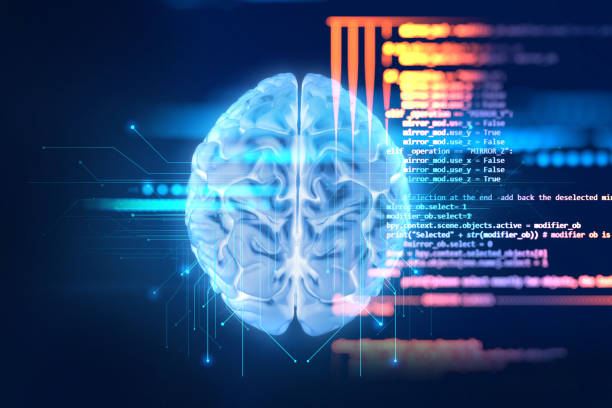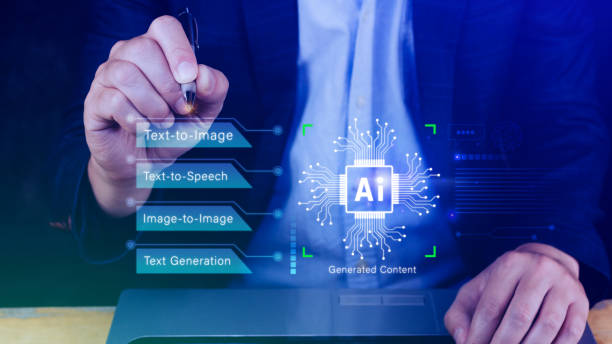What is Artificial Intelligence and How Does It Work?
Artificial intelligence (#ArtificialIntelligence) is a branch of computer science that deals with building machines that are capable of doing things that usually require human intelligence.
These tasks include learning, reasoning, problem-solving, perception, and natural language.
In other words, the goal of #ArtificialIntelligence is to create systems that can think and make decisions like humans.
There are different methods for implementing artificial intelligence.
Some of the most common methods include:
- Machine Learning #MachineLearning This method allows machines to learn from data without explicit programming.
- Neural Networks #NeuralNetworks A computational model inspired by the structure of the human brain.
- Natural Language Processing #NaturalLanguageProcessing Allows machines to understand and generate human language.
- Computer Vision #ComputerVision Allows machines to see and interpret images.
Using these methods, artificial intelligence systems can perform a variety of tasks, including facial recognition, language translation, playing games, and driving cars.
Does your current website display your brand’s credibility as it should? Or does it drive away potential customers?
Rasawab, with years of experience in designing professional corporate websites, is your comprehensive solution.
✅ A modern, beautiful website that matches your brand identity
✅ Significantly increased lead generation and new customers
⚡ Contact Rasawab now for a free consultation on corporate website design!
History and Developments of Artificial Intelligence
The idea of artificial intelligence dates back to the 1950s, when scientists such as Alan Turing and John McCarthy began exploring the possibility of building machines with human-like intelligence.
Over the decades, artificial intelligence has experienced many ups and downs.
In some periods, progress was slow due to technological limitations and lack of data, and in other periods, there were significant leaps forward with new advances.
One of the important turning points in the history of artificial intelligence was the development of deep learning algorithms in the 2010s.
These algorithms allowed #AI systems to achieve superhuman performance in areas such as image and speech recognition.
Today, artificial intelligence is constantly evolving and progressing, and its impact on our lives is increasing day by day.
Click here to preview your posts with PRO themes ››
Important developments in artificial intelligence include:
- 1950s Beginning of artificial intelligence research
- 1960s Development of early artificial intelligence programs
- 1970s Recession in artificial intelligence research
- 1980s Emergence of expert systems
- 1990s Development of machine learning algorithms
- 2000s Emergence of the Internet and increased data
- 2010s Development of deep learning and significant advancements
Applications of Artificial Intelligence in Today’s World
Artificial intelligence has applications in many areas of our lives.
From medicine and education to transportation and entertainment, artificial intelligence is changing the way things are done.
Some of the important applications of artificial intelligence include:
- Medicine Disease diagnosis, drug development, robotic surgery
- Education Personalizing education, providing automatic feedback, developing educational tools
- Transportation Self-driving cars, traffic management, route optimization
- Finance Fraud detection, risk management, algorithmic trading
- Manufacturing Automation of production lines, quality control, failure prediction
- Customer Service Chatbots, answering questions, providing support
Given the increasing progress of artificial intelligence, it is expected that we will see more applications of this technology in our lives in the future.
Here is a simple table to illustrate some of the applications of AI in different industries:
| Industry | AI Application |
|---|---|
| Healthcare | Disease diagnosis, drug discovery |
| Finance | Fraud detection, risk management |
| Retail | Product recommendation, inventory management |
| Manufacturing | Quality control, predictive maintenance |
Machine Learning and its Role in Artificial Intelligence
Machine learning is one of the main sub-branches of artificial intelligence that allows machines to learn from data without explicit programming.
In fact, machine learning teaches machines how to identify patterns using data and make predictions or decisions based on them.
There are different types of machine learning algorithms, including:
- Supervised Learning #SupervisedLearning In this method, the machine is trained using labeled data.
- Unsupervised Learning #UnsupervisedLearning In this method, the machine is trained using unlabeled data.
- Reinforcement Learning #ReinforcementLearning In this method, the machine is trained by trial and error and receiving rewards or penalties.
Machine learning plays a very important role in the development of artificial intelligence, and many advanced artificial intelligence systems use machine learning algorithms to perform their tasks.
Doesn’t your current corporate website reflect your brand’s credibility and strength as it should? Rasawab solves this challenge for you with professional corporate website design.
✅ Increase the credibility and trust of visitors
✅ Attract more targeted customers
⚡ Click here to get a free consultation!
Challenges and Limitations of Artificial Intelligence
Despite significant advances, artificial intelligence still faces challenges and limitations.
Some of these challenges include:
- Lack of Data Many machine learning algorithms require a large amount of data for training.
- Ethical Issues The use of artificial intelligence can raise new ethical issues.
- Discrimination If the training data is biased, artificial intelligence systems can also be biased.
- Interpretability Understanding how complex artificial intelligence systems make decisions can be difficult.
- Security Artificial intelligence systems can be vulnerable to cyberattacks.
To overcome these challenges, more research and the development of ethical and legal standards for the use of artificial intelligence are needed.
The Future of Artificial Intelligence and its Impact on Society
Artificial intelligence is advancing rapidly, and it is expected to have a very large impact on society in the future.
Some of the predictions about the future of artificial intelligence include:
- Automation Many repetitive and routine jobs will be automated by artificial intelligence.
- Personalization Services and products will be personalized based on individual needs and preferences.
- Improved Health Artificial intelligence will help in faster and more accurate diagnosis of diseases and development of new treatments.
- Increased Productivity Artificial intelligence will help increase productivity in various industries.
- Social Changes Artificial intelligence can lead to fundamental changes in the social and economic structure of society.
To cope with these changes, appropriate planning and policy-making are needed to benefit from the advantages of artificial intelligence and avoid its risks.
The future of artificial intelligence is in our hands!
Overview of the Most Important Machine Learning Algorithms
Machine learning algorithms are the beating heart of #ArtificialIntelligence systems.
These algorithms allow machines to learn from data and identify patterns.
Here, we point out some of the most important machine learning algorithms:
- Linear Regression #LinearRegression Used to predict a continuous value based on one or more independent variables.
- Logistic Regression #LogisticRegression Used to predict the probability of an event occurring.
- Support Vector Machine #SupportVectorMachine Used to classify data into two or more categories.
- Decision Tree #DecisionTree Used for classification and regression of data.
- Random Forest #RandomForest A machine learning algorithm that uses a combination of several decision trees to improve prediction accuracy.
- Neural Networks #NeuralNetworks A computational model inspired by the structure of the human brain that is used to learn complex patterns in data.
Choosing the right algorithm for a particular problem depends on the type of data and the desired goal.
| Algorithm | Application | Advantages | Disadvantages |
|---|---|---|---|
| Linear Regression | Predict continuous values | Simple and interpretable | Only suitable for linear data |
| Logistic Regression | Classification | Fast and efficient | Only suitable for binary problems |
| Support Vector Machine | Classification | High accuracy | Complex and time-consuming |
The Impact of Artificial Intelligence on the Labor Market
Artificial intelligence has the potential to create fundamental changes in the labor market.
On the one hand, #ArtificialIntelligence can automate many repetitive and routine jobs, leading to a reduction in the need for human labor in these jobs.
On the other hand, #AI can create new jobs that require new skills.
These skills include technical skills such as programming and data science, as well as soft skills such as critical thinking and problem-solving.
To prepare for changes in the labor market, individuals must continuously update their skills and learn new ones.
Also, governments and organizations should provide programs to support people who lose their jobs and provide them with new skills training.
The impact of artificial intelligence on the labor market needs careful consideration.
Are you tired of your company website not meeting your expectations? With Rasawab, design a professional website that showcases the true face of your business.
✅ Increase the attraction of new customers and sales leads
✅ Increase the credibility and trust of your brand with the audience
⚡ Get a free website design consultation!
Ethical Issues in Artificial Intelligence
Artificial intelligence raises new ethical issues that require careful attention and consideration.
Some of these issues include:
- Privacy Artificial intelligence systems often need to collect and process a large amount of personal data, which can lead to a violation of people’s privacy.
- Discrimination If the training data is biased, artificial intelligence systems can also be biased.
- Responsibility In the event of an error or damage caused by an #ArtificialIntelligence system, determining responsibility is difficult.
- Control There are concerns about controlling #ArtificialIntelligence systems and ensuring that they act in accordance with human values.
To solve these issues, there is a need to develop ethical and legal standards for the use of artificial intelligence.
These standards should help protect privacy, prevent discrimination, determine responsibility, and ensure control of artificial intelligence systems.
How to Learn Artificial Intelligence?
Learning #ArtificialIntelligence can be a challenging but very rewarding process.
There are many resources for learning artificial intelligence, including online courses, books, articles, and practical projects.
To start learning artificial intelligence, you can follow these steps:
- Learn the basic concepts Become familiar with the basic concepts of artificial intelligence, machine learning, and data science.
- Learn a programming language Learning a programming language like Python is essential for implementing artificial intelligence algorithms.
- Learn machine learning algorithms Become familiar with different machine learning algorithms and how they work.
- Do practical projects By doing practical projects, you can apply theoretical concepts and strengthen your skills.
- Join the artificial intelligence community By joining the artificial intelligence community, you can learn from the experiences of others and become familiar with the latest developments in this field.
With effort and perseverance, you can acquire the skills necessary to work in the field of artificial intelligence.
#ArtificialIntelligence is our future.
Frequently Asked Questions
| Question | Answer |
|---|---|
| 1. What is Artificial Intelligence (AI)? | It is a branch of computer science that aims to create machines capable of mimicking human intelligence and performing tasks that require human thinking, such as learning, problem-solving, and decision-making. |
| 2. What are the main types of Artificial Intelligence? | It can be classified into weak artificial intelligence (Narrow AI) that focuses on a specific task, general artificial intelligence (General AI) that possesses comprehensive human capabilities, and super artificial intelligence (Super AI) that exceeds human intelligence. |
| 3. Mention some common applications of Artificial Intelligence in our daily lives. | These include voice assistants (such as Siri and Alexa), recommendation systems (such as Netflix and Amazon), self-driving cars, facial recognition systems, and spam filters. |
| 4. What is the difference between Artificial Intelligence and Machine Learning (Machine Learning)? | Artificial intelligence is the broader concept of creating intelligent machines, while machine learning is a subset of artificial intelligence that focuses on enabling systems to learn from data without explicit programming. |
| 5. What is Deep Learning? | It is a subset of machine learning that uses multi-layer artificial neural networks (deep neural networks) to process data and discover complex patterns, and is used in image and speech recognition. |
| 6. What are the most prominent benefits of Artificial Intelligence? | Improving efficiency and productivity, automating repetitive tasks, making better decisions based on the analysis of big data, and developing solutions to complex problems in fields such as medicine and science. |
| 7. What are the main challenges facing the development and deployment of Artificial Intelligence? | These include the need for vast amounts of high-quality data, privacy and security issues, bias in data and algorithms, and high development and maintenance costs. |
| 8. Does Artificial Intelligence raise ethical or social concerns? | Yes, it raises concerns related to privacy, algorithmic bias, job loss due to automation, responsibility for errors committed by intelligent systems, and the need for a regulatory framework. |
| 9. How can Artificial Intelligence affect the future of the labor market? | It can lead to the automation of some routine jobs, but it will also create new jobs that require advanced skills in the development, operation, and maintenance of artificial intelligence systems. |
| 10. What are some modern or promising technologies in the field of Artificial Intelligence? | These include advanced natural language processing (NLP) (such as large language models such as ChatGPT), computer vision, robotics, and generative AI (Generative AI). |
And other advertising services of Rasa Web Advertising Agency in the field of advertising
Smart Google Ads: A combination of creativity and technology to increase sales through dedicated programming.
Smart Google Ads: A professional solution to improve SEO ranking with a focus on marketing automation.
Smart Google Ads: A combination of creativity and technology for campaign management through attractive user interface design.
Smart Sales Automation: Designed for businesses that seek to increase sales through intelligent data analysis.
Smart Digital Branding: Transform online growth with the help of dedicated programming.
And more than hundreds of other services in the field of internet advertising, advertising consulting, and organizational solutions
Internet Advertising | Advertising Strategy | Advertorial
Resources
DeepMind
, OpenAI
, IBM Artificial Intelligence
, Virgool: What is Artificial Intelligence and How Does it Work?
? Are you ready for your business to take off with a fast website design and professional digital marketing strategies? Rasa Web Digital Marketing Agency, is your reliable partner on the path to online growth and success. With an innovative and creative approach, we create a powerful and memorable presence for your business in the digital world. Build the future of your business with us.
📍 Tehran, Mirdamad Street, next to the Central Bank, South Kazerun Alley, Ramin Alley, No. 6














